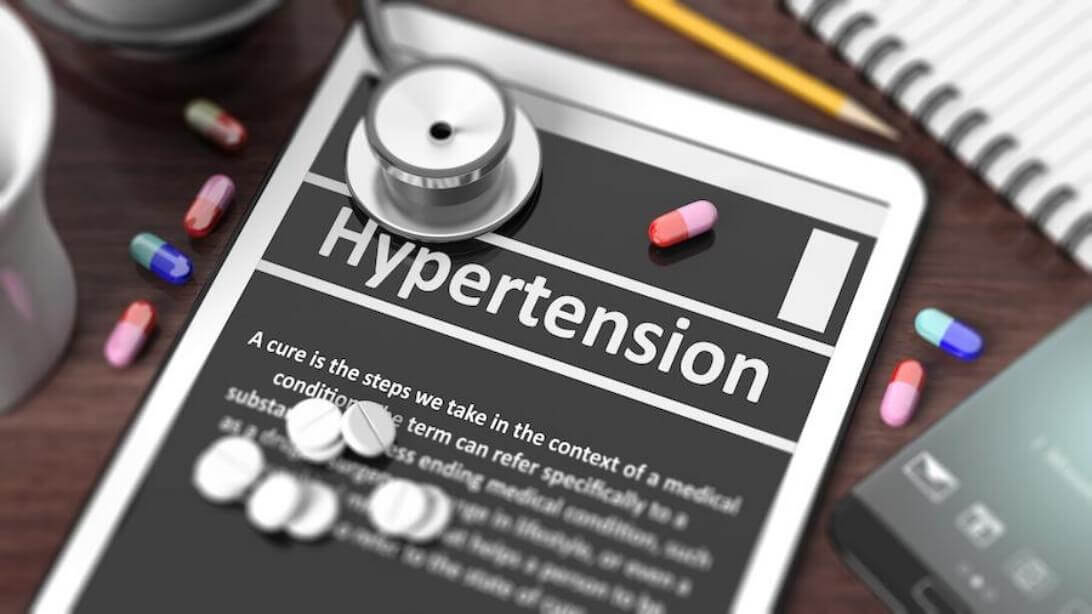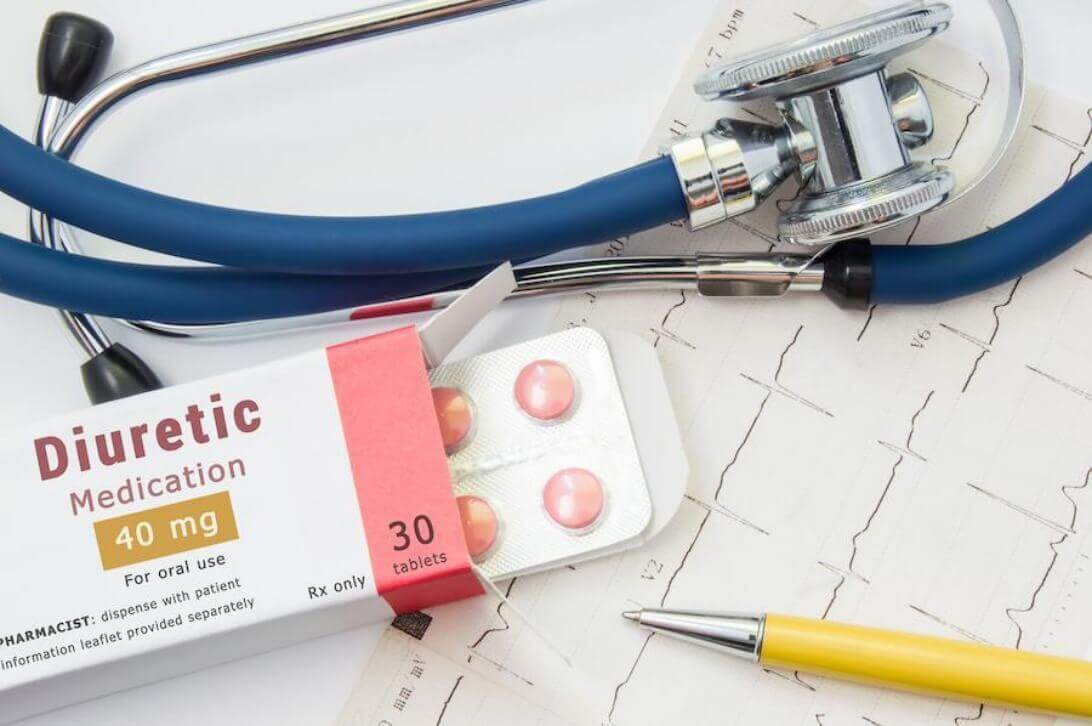Highlights
- Chlorthalidone is a blood pressure medication that can reduce the risk of heart disease and stroke.
- As a “water pill,” chlorthalidone belongs to the thiazide diuretic drug class of medications, which help remove excess salt and fluids from the body.
- Like all medications, chlorthalidone may have side effects and isn’t suitable for everyone.
Nearly half of all Americans have high blood pressure, which can lead to many other health conditions like heart attack, congestive heart failure, kidney disease, and more. One way to manage high blood pressure is by reducing the amount of fluid in the body. For many people, water pills like chlorthalidone are a good way to promote heart health.
What Is Chlorthalidone and What Is It Used For?
Fluid retention (edema) is sometimes related to congestive heart failure, cirrhosis of the liver, or kidney disease. This excess swelling can lead to high blood pressure (hypertension), but chlorthalidone releases this fluid and relieves stress on the heart.
Besides its primary uses, chlorthalidone is sometimes used for off-label treatments for hypertension in people with diabetes and to prevent calcium-containing kidney stones.
The term “off-label” means that a medication has not been approved by the FDA for these conditions, and it may or may not be as effective for these unapproved uses. Off-label use of a medication should only be done under the guidance of a healthcare professional.
How Does Chlorthalidone Work?
Chlorthalidone is a thiazide diuretic that works by increasing the amount of urine the body produces. Urine is made up of excess fluid as well as salts and waste, all of which can contribute to high blood pressure. Chlorthalidone reduces overall fluid volume in the body and relaxes blood vessel walls, leading to lower blood pressure.
Chlorthalidone Dosage and Administration
Chlorthalidone is usually available in 25 and 50 milligram tablets. The medication is typically taken once daily, with or without food, but the exact regimen will depend on the individual’s diagnosis, age, and response to treatment.
Chlorthalidone is also a component of Tenoretic, a combination of chlorthalidone and atenolol. Together, chlorthalidone and atenolol, a beta blocker, relax the blood vessels and reduce strain on the heart.
Note that the dosage regimens above are general guidelines; only a healthcare provider can determine the appropriate dosage for an individual.
How Should I Take Chlorthalidone?
If your healthcare provider has prescribed chlorthalidone, be sure to take this medication exactly as instructed. This medication is usually taken once daily, and most people prefer to take it in the morning to prevent sleep disturbances due to increased urination. This medication can be taken with or without food. Unless your doctor recommends otherwise, it’s important to drink plenty of water and stay hydrated while taking chlorthalidone.

What Are the Potential Side Effects of Chlorthalidone?
Like all medications, chlorthalidone may have side effects. This list is not complete and not everyone experiences the same symptoms, so talk to your doctor or pharmacist about chlorthalidone and any side effects you experience.
Common Side Effects of Chlorthalidone
- Dizziness or lightheadedness
- Headache
- Nausea
- Electrolyte imbalances
Less Common but More Serious Side Effects of Chlorthalidone
- Severe allergic reactions, which may include swelling, difficulty breathing, and hives
- Severe skin reactions
- Electrolyte imbalances with significant symptoms
- Liver or kidney function changes
What Should I Avoid When Taking Chlorthalidone?
While taking chlorthalidone, follow your healthcare provider’s instructions, as well as these precautions:
- Wear sunscreen and avoid excessive exposure to sunlight or UV lamps. Chlorthalidone can make your skin more sensitive to the sun.
- Chlorthalidone can affect your blood sugar, so if you have diabetes, be sure to check your blood sugar regularly.
- Limit or avoid alcohol, marijuana, and sedatives while using this medication. Overuse can exacerbate the blood pressure-lowering effects of chlorthalidone and increase the risk of side effects like dizziness.

What Should I Do If I Miss a Dose of Chlorthalidone?
If you miss a dose, take it as soon as you remember, unless it’s almost time for your next dose. In that case, skip the missed dose and resume your usual schedule. Do not take an extra dose to make up for the missed one.
What Should I Do If I Overdose on Chlorthalidone?
If you suspect an overdose of chlorthalidone, seek immediate medical attention or call a poison control center. In the event of an overdose, you may experience electrolyte imbalances. Symptoms of an overdose may include severe nausea, weakness, dizziness, dry mouth, thirst, rapid heartbeat, and muscle pain or weakness. You may also experience low blood pressure (hypotension).
What Precautions Should I Take With Chlorthalidone?
Before taking this medication, speak to your doctor about chlorthalidone’s effects and follow these special precautions:
- Allergy overview. Tell your healthcare provider about any allergies to chlorthalidone, sulfa drugs, or other medications.
- Medication review. Mention all the prescription and nonprescription medications you’re taking, including blood pressure drugs, NSAIDs like ibuprofen or naproxen, corticosteroids, lithium, diabetes medicines, and vitamins. If you’re also taking cholestyramine or colestipol, take those medications at least one hour after chlorthalidone.
- Discuss health history. Inform your doctor if you have had diabetes, gout, or any kidney, liver, thyroid, or parathyroid diseases.
- Pregnancy and breastfeeding. Tell your doctor if you are pregnant, planning to become pregnant, or are breastfeeding.
- Prepare for upcoming surgeries. If you have any surgery scheduled, including dental procedures, make sure to inform the surgeon or dentist that you are taking chlorthalidone.
- Be cautious of drowsiness effects. Understand that chlorthalidone may cause drowsiness; avoid driving or operating machinery until you understand its effects on you. Remember that drinking alcohol can intensify the drowsiness caused by chlorthalidone.
- Protect yourself from the sun. Plan to minimize sun exposure and wear protective clothing, sunglasses, and sunscreen, because chlorthalidone can increase sun sensitivity.

Contraindications of Chlorthalidone
Some people should not take chlorthalidone. Others should use it with caution under close medical supervision.
Keep in mind that these lists are general guidelines. In special cases, doctors may feel the benefits of taking a particular medication outweigh the risks, so if you are in one of these groups, talk to your doctor about your personal situation.
Who Should Not Take Chlorthalidone?
- Individuals with a known allergy to chlorthalidone or sulfa drugs
- People with severe kidney or liver disease
- People with anuria (the inability to produce urine)
Who Should Take Chlorthalidone with Caution?
- Patients with diabetes, because this medication can affect blood sugar levels
- People with gout, because chlorthalidone can worsen this condition
- People with a history of lupus, because chlorthalidone can trigger a flareup
- People with a history of allergies or asthma
- People with electrolyte imbalances or those at risk for them
Are There Any Other Potential Drug Interactions With Chlorthalidone?
According to Drugs.com, a significant number of drugs and supplements can interact with this medication.
The most important potential interactions to be aware of include:
- Antiarrhythmics (including amiodarone and arsenic trioxide) can increase the risk of abnormal heart rhythm when taken with chlorthalidone
- Antipsychotics like ziprasidone can increase the risk of QT prolongation when taken with chlorthalidone
- Gastrointestinal medications like dolasetron, droperidol, and cisapride, because these can increase the risk of QT prolongation
- Muscle relaxers like tizanidine can lower blood pressure too much
- Lithium interactions with chlorthalidone may decrease renal clearance, resulting in increased lithium levels
For the complete known interactions list, visit the Drugs.com Drug Interactions Checker. However, no list of potential drug interactions is complete, so double-check with your provider and let them know if you experience any new or unusual symptoms after taking this medication.

Less Swelling Supports a Healthier Heart
Chlorthalidone is an effective medication for managing high blood pressure and fluid retention, but it’s important to understand its uses, side effects, and precautions. Before taking this medication, talk to your healthcare provider about chlorthalidone and its effects. If chlorthalidone is part of your treatment plan, you can get the best price with BidRx.
Get the Lowest Price for Chlorthalidone With BidRx
If you’re taking a diuretic to reduce blood pressure and ease swelling, we can help you get your prescriptions for the best prices. Compare offers from competing pharmacies and choose the offer that fits your budget. Find your medication and sign up today!
This information is intended for general informational purposes only. It is not a substitute for professional medical advice, diagnosis, or treatment. Always seek the advice of your physician or other qualified health provider with any questions you may have regarding a medical condition or medication.
